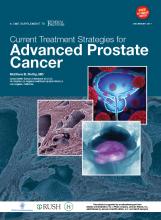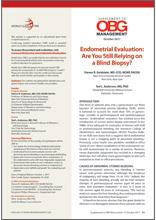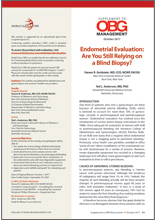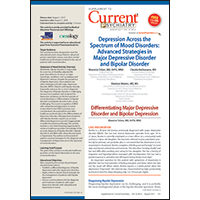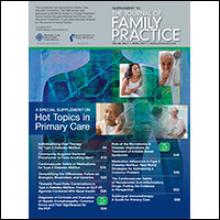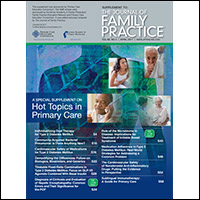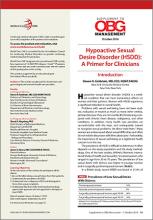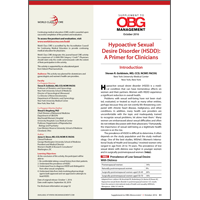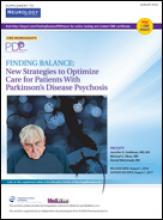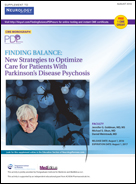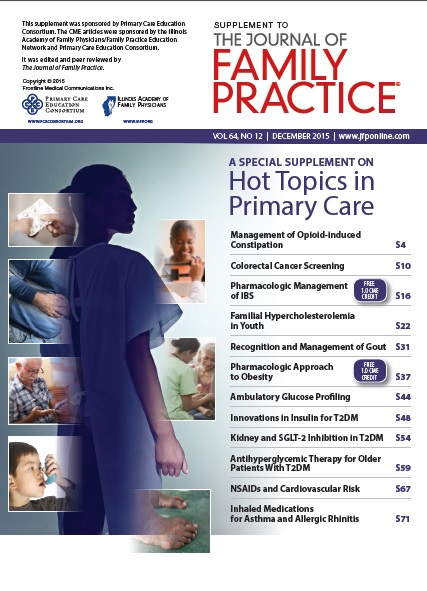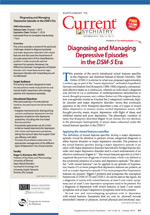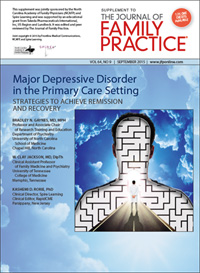User login
CME: Current Treatment Strategies for Advanced Prostate Cancer
Click here to read the supplement.
This activity is supported by an educational grant from Astellas and Medivation, Inc. a Pfizer company, Janssen Biotech, Inc., administered byJanssen Scientific Affairs, LLC. and Sanofi Genzyme.
In this CME supplement, you will learn to:
- Identify best practices for integrating currently available treatment options for advanced prostate cancer, including immunologic therapies, new secondary hormonal agents, chemotherapy, and radiopharmaceuticals
- Describe new management options for metastatic hormonesensitive prostate cancer (mHSPC)
- Outline considerations for current and emerging therapies in the management of patients with metastatic castration-resistant prostate cancer (mCSPC)
- Understand how the molecular and biochemical underpinnings of mCRPC can impact treatment course and selection
Click here to read the supplement.
After reading, take the posttest evaluation at https://www.surveymonkey.com/r/WMMYNHP
Click here to read the supplement.
This activity is supported by an educational grant from Astellas and Medivation, Inc. a Pfizer company, Janssen Biotech, Inc., administered byJanssen Scientific Affairs, LLC. and Sanofi Genzyme.
In this CME supplement, you will learn to:
- Identify best practices for integrating currently available treatment options for advanced prostate cancer, including immunologic therapies, new secondary hormonal agents, chemotherapy, and radiopharmaceuticals
- Describe new management options for metastatic hormonesensitive prostate cancer (mHSPC)
- Outline considerations for current and emerging therapies in the management of patients with metastatic castration-resistant prostate cancer (mCSPC)
- Understand how the molecular and biochemical underpinnings of mCRPC can impact treatment course and selection
Click here to read the supplement.
After reading, take the posttest evaluation at https://www.surveymonkey.com/r/WMMYNHP
Click here to read the supplement.
This activity is supported by an educational grant from Astellas and Medivation, Inc. a Pfizer company, Janssen Biotech, Inc., administered byJanssen Scientific Affairs, LLC. and Sanofi Genzyme.
In this CME supplement, you will learn to:
- Identify best practices for integrating currently available treatment options for advanced prostate cancer, including immunologic therapies, new secondary hormonal agents, chemotherapy, and radiopharmaceuticals
- Describe new management options for metastatic hormonesensitive prostate cancer (mHSPC)
- Outline considerations for current and emerging therapies in the management of patients with metastatic castration-resistant prostate cancer (mCSPC)
- Understand how the molecular and biochemical underpinnings of mCRPC can impact treatment course and selection
Click here to read the supplement.
After reading, take the posttest evaluation at https://www.surveymonkey.com/r/WMMYNHP
Endometrial Evaluation: Are You Still Relying on a Blind Biopsy?
One-third of patients who visit a gynecologist are there because of abnormal uterine bleeding (AUB), which is believed to account for more than 70% of gyneco¬logic consults in perimenopausal and postmenopausal women. The American College of Obstetricians and Gynecologists Practice Bulle¬tin on AUB now states that a negative blind endometrial biopsy is not a stopping point in persistent bleeding.
In this supplement, learn about the advantages of diagnosing AUB using a hysteroscope.
- Authors:
- Steven R. Goldstein, MD, CCD, NCMP, FACOG
- New York University Medical Center New York, New York
- Ted L. Anderson, MD, PhD
- Vanderbilt University Medical School Nashville, Tennessee
- Click here to read this supplement.
To access the posttest and evaluation, visit
www.worldclasscme.com/endometrialevaluation
One-third of patients who visit a gynecologist are there because of abnormal uterine bleeding (AUB), which is believed to account for more than 70% of gyneco¬logic consults in perimenopausal and postmenopausal women. The American College of Obstetricians and Gynecologists Practice Bulle¬tin on AUB now states that a negative blind endometrial biopsy is not a stopping point in persistent bleeding.
In this supplement, learn about the advantages of diagnosing AUB using a hysteroscope.
- Authors:
- Steven R. Goldstein, MD, CCD, NCMP, FACOG
- New York University Medical Center New York, New York
- Ted L. Anderson, MD, PhD
- Vanderbilt University Medical School Nashville, Tennessee
- Click here to read this supplement.
To access the posttest and evaluation, visit
www.worldclasscme.com/endometrialevaluation
One-third of patients who visit a gynecologist are there because of abnormal uterine bleeding (AUB), which is believed to account for more than 70% of gyneco¬logic consults in perimenopausal and postmenopausal women. The American College of Obstetricians and Gynecologists Practice Bulle¬tin on AUB now states that a negative blind endometrial biopsy is not a stopping point in persistent bleeding.
In this supplement, learn about the advantages of diagnosing AUB using a hysteroscope.
- Authors:
- Steven R. Goldstein, MD, CCD, NCMP, FACOG
- New York University Medical Center New York, New York
- Ted L. Anderson, MD, PhD
- Vanderbilt University Medical School Nashville, Tennessee
- Click here to read this supplement.
To access the posttest and evaluation, visit
www.worldclasscme.com/endometrialevaluation
Depression Across the Spectrum of Mood Disorders: Advanced Strategies in Major Depressive Disorder and Bipolar Disorder
Mauricio Tohen, MD, DrPH, MBA
Professor and Chair
Department of Psychiatry and Behavioral Sciences
University of New Mexico School of Medicine
Albuquerque, New Mexico
Claudia Baldassano, MD
Associate Professor of Psychiatry
Department of Psychiatry
University of Pennsylvania School of Medicine
Philadelphia, Pennsylvania
Vladimir Maletic, MD, MS
Clinical Professor of Neuropsychiatry and Behavioral Science
University of South Carolina School of Medicine
Greenville, South Carolina
Consulting Associate
Division of Child and Adolescent Psychiatry Department of Psychiatry
Duke University
Durham, North Carolina
Click here to read the supplement
After reading, visit https://MERdepression.cvent.com to complete the posttest and evaluation for CME/CE credit.
Mauricio Tohen, MD, DrPH, MBA
Professor and Chair
Department of Psychiatry and Behavioral Sciences
University of New Mexico School of Medicine
Albuquerque, New Mexico
Claudia Baldassano, MD
Associate Professor of Psychiatry
Department of Psychiatry
University of Pennsylvania School of Medicine
Philadelphia, Pennsylvania
Vladimir Maletic, MD, MS
Clinical Professor of Neuropsychiatry and Behavioral Science
University of South Carolina School of Medicine
Greenville, South Carolina
Consulting Associate
Division of Child and Adolescent Psychiatry Department of Psychiatry
Duke University
Durham, North Carolina
Click here to read the supplement
After reading, visit https://MERdepression.cvent.com to complete the posttest and evaluation for CME/CE credit.
Mauricio Tohen, MD, DrPH, MBA
Professor and Chair
Department of Psychiatry and Behavioral Sciences
University of New Mexico School of Medicine
Albuquerque, New Mexico
Claudia Baldassano, MD
Associate Professor of Psychiatry
Department of Psychiatry
University of Pennsylvania School of Medicine
Philadelphia, Pennsylvania
Vladimir Maletic, MD, MS
Clinical Professor of Neuropsychiatry and Behavioral Science
University of South Carolina School of Medicine
Greenville, South Carolina
Consulting Associate
Division of Child and Adolescent Psychiatry Department of Psychiatry
Duke University
Durham, North Carolina
Click here to read the supplement
After reading, visit https://MERdepression.cvent.com to complete the posttest and evaluation for CME/CE credit.
Hot Topics in Primary Care
This supplement includes 2 CME credits. (scroll down)
Topics include:
- Biologics, Biosimilars, and Generics
- Community-Acquired Bacterial Pneumonia
- Cardiovascular Safety of Medications for Type 2 Diabetes Mellitus
- Dual therapy for Type 2 Diabetes Mellitus
- GLP-1R Agonists
- Medication Adherence in Type 2 Diabetes Mellitus
- NSAIDs
- Sublingual Immunotherapy
This supplement offers the opportunity to earn a total of 2 CME credits.
Credit is awarded for successful completion of the online evaluations at the links below; these links may also be found within the supplement on the first page of each article.
- Diagnosis of Cirrhosis and Evaluation of Hepatic Encephalopathy: Common Errors and Their Significance for the PCP
- To complete the online evaluation and receive 1 CME credit for this article: please click on the link at the end of the article or go to http://www.pceconsortium.org/liver.
- Role of the Microbiome in Disease: Implications for Treatment of Irritable Bowel Syndrome
- To complete the online evaluation and receive 1 CME credit for this article: please click on the link at the end of the article or go to http://www.pceconsortium.org/microbiome.
This supplement includes 2 CME credits. (scroll down)
Topics include:
- Biologics, Biosimilars, and Generics
- Community-Acquired Bacterial Pneumonia
- Cardiovascular Safety of Medications for Type 2 Diabetes Mellitus
- Dual therapy for Type 2 Diabetes Mellitus
- GLP-1R Agonists
- Medication Adherence in Type 2 Diabetes Mellitus
- NSAIDs
- Sublingual Immunotherapy
This supplement offers the opportunity to earn a total of 2 CME credits.
Credit is awarded for successful completion of the online evaluations at the links below; these links may also be found within the supplement on the first page of each article.
- Diagnosis of Cirrhosis and Evaluation of Hepatic Encephalopathy: Common Errors and Their Significance for the PCP
- To complete the online evaluation and receive 1 CME credit for this article: please click on the link at the end of the article or go to http://www.pceconsortium.org/liver.
- Role of the Microbiome in Disease: Implications for Treatment of Irritable Bowel Syndrome
- To complete the online evaluation and receive 1 CME credit for this article: please click on the link at the end of the article or go to http://www.pceconsortium.org/microbiome.
This supplement includes 2 CME credits. (scroll down)
Topics include:
- Biologics, Biosimilars, and Generics
- Community-Acquired Bacterial Pneumonia
- Cardiovascular Safety of Medications for Type 2 Diabetes Mellitus
- Dual therapy for Type 2 Diabetes Mellitus
- GLP-1R Agonists
- Medication Adherence in Type 2 Diabetes Mellitus
- NSAIDs
- Sublingual Immunotherapy
This supplement offers the opportunity to earn a total of 2 CME credits.
Credit is awarded for successful completion of the online evaluations at the links below; these links may also be found within the supplement on the first page of each article.
- Diagnosis of Cirrhosis and Evaluation of Hepatic Encephalopathy: Common Errors and Their Significance for the PCP
- To complete the online evaluation and receive 1 CME credit for this article: please click on the link at the end of the article or go to http://www.pceconsortium.org/liver.
- Role of the Microbiome in Disease: Implications for Treatment of Irritable Bowel Syndrome
- To complete the online evaluation and receive 1 CME credit for this article: please click on the link at the end of the article or go to http://www.pceconsortium.org/microbiome.
Hypoactive Sexual Desire Disorder (HSDD): A Primer for Clinicians
- Be comfortable taking a sexual history from their patients.
- Understand the prevalence of HSDD.
- Understand how to diagnose HSDD and distinguish it from other sexual complaints.
- Understand data from trials involving pharmacologic agents both approved and not approved in attempts to treat HSDD.
- Employ multidisciplinary communication strategies to improve quality of life in patients with PDP
This CME supplement entitles the reader to 1 free CME credit.
Click here to read supplement.
After reading the supplement, click here to access the CME posttest
- Be comfortable taking a sexual history from their patients.
- Understand the prevalence of HSDD.
- Understand how to diagnose HSDD and distinguish it from other sexual complaints.
- Understand data from trials involving pharmacologic agents both approved and not approved in attempts to treat HSDD.
- Employ multidisciplinary communication strategies to improve quality of life in patients with PDP
This CME supplement entitles the reader to 1 free CME credit.
Click here to read supplement.
After reading the supplement, click here to access the CME posttest
- Be comfortable taking a sexual history from their patients.
- Understand the prevalence of HSDD.
- Understand how to diagnose HSDD and distinguish it from other sexual complaints.
- Understand data from trials involving pharmacologic agents both approved and not approved in attempts to treat HSDD.
- Employ multidisciplinary communication strategies to improve quality of life in patients with PDP
This CME supplement entitles the reader to 1 free CME credit.
Click here to read supplement.
After reading the supplement, click here to access the CME posttest
Finding Balance: New Strategies to Optimize Care for Patients With Parkinson’s Disease Psychosis
This activity is supported by an independent educational grant from ACADIA Pharmaceuticals LLC
After reading this CME supplement, health care providers will have improved their ability to:
|
This CME supplement entitles the reader to 1.0 AMA PRA Category 1 Credit™
Click here to read supplement.
After reading the supplement, click here to access the CME posttest
This activity is supported by an independent educational grant from ACADIA Pharmaceuticals LLC
After reading this CME supplement, health care providers will have improved their ability to:
|
This CME supplement entitles the reader to 1.0 AMA PRA Category 1 Credit™
Click here to read supplement.
After reading the supplement, click here to access the CME posttest
This activity is supported by an independent educational grant from ACADIA Pharmaceuticals LLC
After reading this CME supplement, health care providers will have improved their ability to:
|
This CME supplement entitles the reader to 1.0 AMA PRA Category 1 Credit™
Click here to read supplement.
After reading the supplement, click here to access the CME posttest
Imaging of the Breast 2016: Reducing the Confusion
Program Director
Steven R. Goldstein, MD, CCD, NCMP, FACOG
Professor of Obstetrics and Gynecology
New York University School of Medicine
Director of Gynecological Ultrasound
Co-Director of Bone Densitometry
Department of Obstetrics and Gynecology
New York University Medical Center
New York, New York
Authors/Editors
Reni S. Butler, MD
Assistant Professor, Diagnostic Radiology
Yale University
New Haven, Connecticut
Bonnie N. Joe, MD, PhD, FSBI
Professor of Radiology and Biomedical Imaging
Chief, Breast Imaging
University of California, San Francisco
San Francisco, California
Bruce A. Porter, MD, FACR
Clinical Associate Professor
Department of Radiology
University of Washington School of Medicine
Seattle, Washington
Michael J. Ulissey, MD, FACR
Adjunct Professor of Radiology
University of Texas
Health Sciences Center
San Antonio, Texas
Breast Diagnostic Centers
Auburn and Federal Way, Washington
Conflict of Interest Disclosure
Steven R. Goldstein, MD, CCD, NCMP, FACOG
Consultant: Cook OB/GYN, fees received
No Disclosures to Declare
Reni S. Butler, MD; Bonnie N. Joe, MD, PhD, FSBI;
Bruce A. Porter, MD, FACR; Michael J. Ulissey, MD, FACR;
Heidi M. Wilson, Course Director
OBG Manag. 2016 June;28 (6 suppl):S1-S8.
Program Director
Steven R. Goldstein, MD, CCD, NCMP, FACOG
Professor of Obstetrics and Gynecology
New York University School of Medicine
Director of Gynecological Ultrasound
Co-Director of Bone Densitometry
Department of Obstetrics and Gynecology
New York University Medical Center
New York, New York
Authors/Editors
Reni S. Butler, MD
Assistant Professor, Diagnostic Radiology
Yale University
New Haven, Connecticut
Bonnie N. Joe, MD, PhD, FSBI
Professor of Radiology and Biomedical Imaging
Chief, Breast Imaging
University of California, San Francisco
San Francisco, California
Bruce A. Porter, MD, FACR
Clinical Associate Professor
Department of Radiology
University of Washington School of Medicine
Seattle, Washington
Michael J. Ulissey, MD, FACR
Adjunct Professor of Radiology
University of Texas
Health Sciences Center
San Antonio, Texas
Breast Diagnostic Centers
Auburn and Federal Way, Washington
Conflict of Interest Disclosure
Steven R. Goldstein, MD, CCD, NCMP, FACOG
Consultant: Cook OB/GYN, fees received
No Disclosures to Declare
Reni S. Butler, MD; Bonnie N. Joe, MD, PhD, FSBI;
Bruce A. Porter, MD, FACR; Michael J. Ulissey, MD, FACR;
Heidi M. Wilson, Course Director
Program Director
Steven R. Goldstein, MD, CCD, NCMP, FACOG
Professor of Obstetrics and Gynecology
New York University School of Medicine
Director of Gynecological Ultrasound
Co-Director of Bone Densitometry
Department of Obstetrics and Gynecology
New York University Medical Center
New York, New York
Authors/Editors
Reni S. Butler, MD
Assistant Professor, Diagnostic Radiology
Yale University
New Haven, Connecticut
Bonnie N. Joe, MD, PhD, FSBI
Professor of Radiology and Biomedical Imaging
Chief, Breast Imaging
University of California, San Francisco
San Francisco, California
Bruce A. Porter, MD, FACR
Clinical Associate Professor
Department of Radiology
University of Washington School of Medicine
Seattle, Washington
Michael J. Ulissey, MD, FACR
Adjunct Professor of Radiology
University of Texas
Health Sciences Center
San Antonio, Texas
Breast Diagnostic Centers
Auburn and Federal Way, Washington
Conflict of Interest Disclosure
Steven R. Goldstein, MD, CCD, NCMP, FACOG
Consultant: Cook OB/GYN, fees received
No Disclosures to Declare
Reni S. Butler, MD; Bonnie N. Joe, MD, PhD, FSBI;
Bruce A. Porter, MD, FACR; Michael J. Ulissey, MD, FACR;
Heidi M. Wilson, Course Director
OBG Manag. 2016 June;28 (6 suppl):S1-S8.
OBG Manag. 2016 June;28 (6 suppl):S1-S8.
Hot Topics in Primary Care
Click here to read the Full Supplement
Credit is awarded for successful completion of the online evaluations at the links below; these links may also be found within the supplement on the first page of each article.
CME CREDIT: "Individualizing Pharmacologic Management of Irritable Bowel Syndrome"
- To complete the online evaluation and receive 1 CME credit for this article: please click on the link at the end of the article or go to pceconsortium.org/ibs.
CME CREDIT: "Pharmacologic Approach to Obesity Management"
- To complete the online evaluation and receive 1 CME credit for this article: please click on the link at the end of the article or go to cme.iafp.com/ and find the article in the Post-Tests and Evaluation Only tab.
Click here to read the Full Supplement
Credit is awarded for successful completion of the online evaluations at the links below; these links may also be found within the supplement on the first page of each article.
CME CREDIT: "Individualizing Pharmacologic Management of Irritable Bowel Syndrome"
- To complete the online evaluation and receive 1 CME credit for this article: please click on the link at the end of the article or go to pceconsortium.org/ibs.
CME CREDIT: "Pharmacologic Approach to Obesity Management"
- To complete the online evaluation and receive 1 CME credit for this article: please click on the link at the end of the article or go to cme.iafp.com/ and find the article in the Post-Tests and Evaluation Only tab.
Click here to read the Full Supplement
Credit is awarded for successful completion of the online evaluations at the links below; these links may also be found within the supplement on the first page of each article.
CME CREDIT: "Individualizing Pharmacologic Management of Irritable Bowel Syndrome"
- To complete the online evaluation and receive 1 CME credit for this article: please click on the link at the end of the article or go to pceconsortium.org/ibs.
CME CREDIT: "Pharmacologic Approach to Obesity Management"
- To complete the online evaluation and receive 1 CME credit for this article: please click on the link at the end of the article or go to cme.iafp.com/ and find the article in the Post-Tests and Evaluation Only tab.
Diagnosing and Managing Depressive Episodes in the DSM-5 Era
Major Depressive Disorder in the Primary Care Setting: Strategies to Achieve Remission and Recovery
Family physicians are on the frontline for depression care, often being the first line of defense for diagnosis and management. This 1.25-hour, CME-certified activity will provide clinicians with a comprehensive review on the following:
- Clinical factors in the primary care setting that influence treatment outcomes in major depressive disorder
- Identification and management of residual symptoms
- Tools for effective monitoring of treatment outcomes
- Nonpharmacologic and pharmacologic therapies to treat patients to goal: remission and recovery
- Strategies to promote patient-focused, recovery-oriented care.
Family physicians are on the frontline for depression care, often being the first line of defense for diagnosis and management. This 1.25-hour, CME-certified activity will provide clinicians with a comprehensive review on the following:
- Clinical factors in the primary care setting that influence treatment outcomes in major depressive disorder
- Identification and management of residual symptoms
- Tools for effective monitoring of treatment outcomes
- Nonpharmacologic and pharmacologic therapies to treat patients to goal: remission and recovery
- Strategies to promote patient-focused, recovery-oriented care.
Family physicians are on the frontline for depression care, often being the first line of defense for diagnosis and management. This 1.25-hour, CME-certified activity will provide clinicians with a comprehensive review on the following:
- Clinical factors in the primary care setting that influence treatment outcomes in major depressive disorder
- Identification and management of residual symptoms
- Tools for effective monitoring of treatment outcomes
- Nonpharmacologic and pharmacologic therapies to treat patients to goal: remission and recovery
- Strategies to promote patient-focused, recovery-oriented care.
